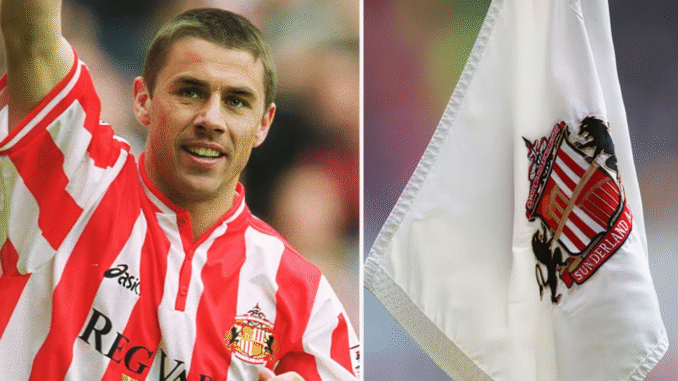
Over the years, Sunderland has been home to many iconic players, but few have left as profound a mark as Kevin Phillips. Arguably the club’s most legendary striker in recent memory, Phillips made his name with the Black Cats between 1997 and 2003, delivering performances that earned him a lasting place in the club’s history.
Following their relegation from the Premier League in the summer of 1997, Sunderland, under the guidance of Peter Reid, embarked on a period of transition. That summer not only marked their move from the historic Roker Park to the new 42,000-seater Stadium of Light but also heralded a shift in strategy as they sought fresh talent to fuel their promotion push. Among their signings was a relatively unknown 23-year-old forward from Watford, Kevin Phillips, brought in for a modest £325,000.
Despite being a low-key acquisition at the time, Phillips would soon exceed all expectations. Hailing from Hitchin, his impact was immediate and profound. He transformed into one of the most prolific strikers in Europe during his time with Sunderland—a remarkable return on such a minimal investment. What began as a quiet transfer quickly turned into one of the club’s most celebrated deals.
Phillips rapidly endeared himself to the Sunderland faithful. A true number nine, he was a clinical finisher with a relentless hunger for goals. After a slow start at the Stadium of Light, he found his rhythm, becoming the first Sunderland player since Brian Clough in 1961/62 to score 30 goals in a single season. Although the team narrowly missed promotion that year, finishing third in Division One, Phillips’ form was a revelation.
His second season was even more impactful. Scoring 23 goals in just 26 league matches, he propelled Sunderland back to the Premier League and earned a call-up to the England squad—an impressive feat for a player still in the second tier. Doubts lingered over whether he could replicate that success in the top flight, but he silenced critics in spectacular fashion. Teaming up with Niall Quinn, Phillips bagged 30 Premier League goals, winning the Golden Boot and the prestigious European Golden Shoe—an unprecedented achievement for an English player who had never previously featured in the top division.
Thanks in large part to his exploits, Sunderland narrowly missed out on European qualification two seasons in a row. He continued to be a reliable scorer over the following campaigns, though his output declined slightly. Nevertheless, he managed 11 and 6 league goals respectively in the 2001/02 and 2002/03 seasons before Sunderland were relegated once more. Phillips then moved to Southampton for a significant profit of £3.25 million.
By the time he left Wearside, Phillips was not just a fan favourite—he had become a club legend. His incredible goal-scoring feats left an indelible legacy, and many Sunderland fans still dream of seeing another striker of his calibre wear the red and white stripes.
Although he went on to play for other clubs, Phillips never quite reached the same heights he enjoyed at Sunderland. He was 30 when he joined Southampton and, despite still managing double-digit league goals during his time there, his influence waned. A brief and less successful stint at Aston Villa followed, before a move to West Brom in 2006. There, he once again found form, scoring 46 goals in 81 games and helping the Baggies secure promotion in 2008.
His career continued with respectable spells at Birmingham City, Blackpool, Crystal Palace, and Leicester City before he retired in 2014 at the age of 40. While he had notable moments elsewhere, Phillips’ prime years unquestionably came at Sunderland—a point he himself acknowledged in a 2017 interview with PlanetFootball.
Reflecting on his historic 1999/2000 season, Phillips expressed pride but also a sense that his achievements had not been fully appreciated. He noted that if a modern English player scored 30 goals in a Premier League season, they would be heralded globally and likely secure a high-profile move. In contrast, his own success was often seen as an anomaly, despite the fact that he reached those heights while playing for a team that finished seventh—well outside the traditional elite.
Phillips believed that scoring 30 goals in such a team made the feat all the more remarkable. Winning the European Golden Shoe was an accomplishment unmatched by any English striker since, especially in the modern era dominated by global superstars like Messi, Ronaldo, and Neymar. Though it hasn’t always been given the attention it deserves, Phillips remains immensely proud of that achievement.
While the broader football world may have overlooked his brilliance, Sunderland fans certainly have not. Kevin Phillips remains a revered figure on Wearside—a player whose legacy endures as a shining example of what can happen when talent, determination, and opportunity align. Sunderland truly hit the jackpot with his signing in 1997.
Leave a Reply